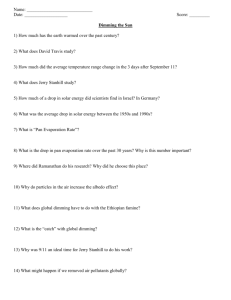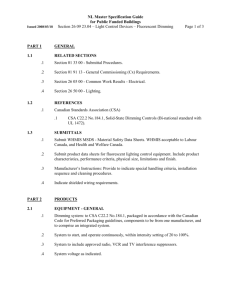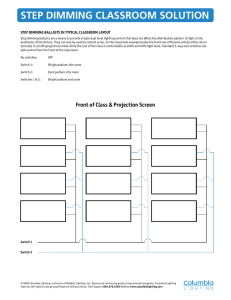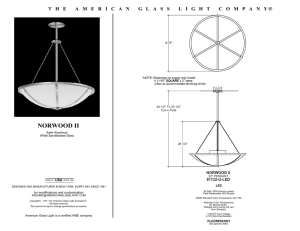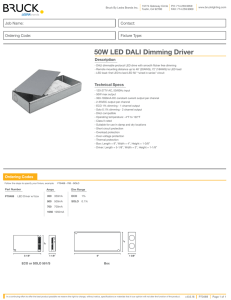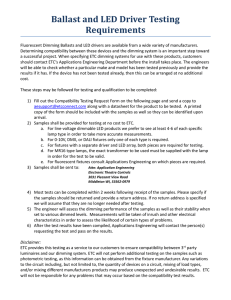Light Control Equipment Dimming
advertisement
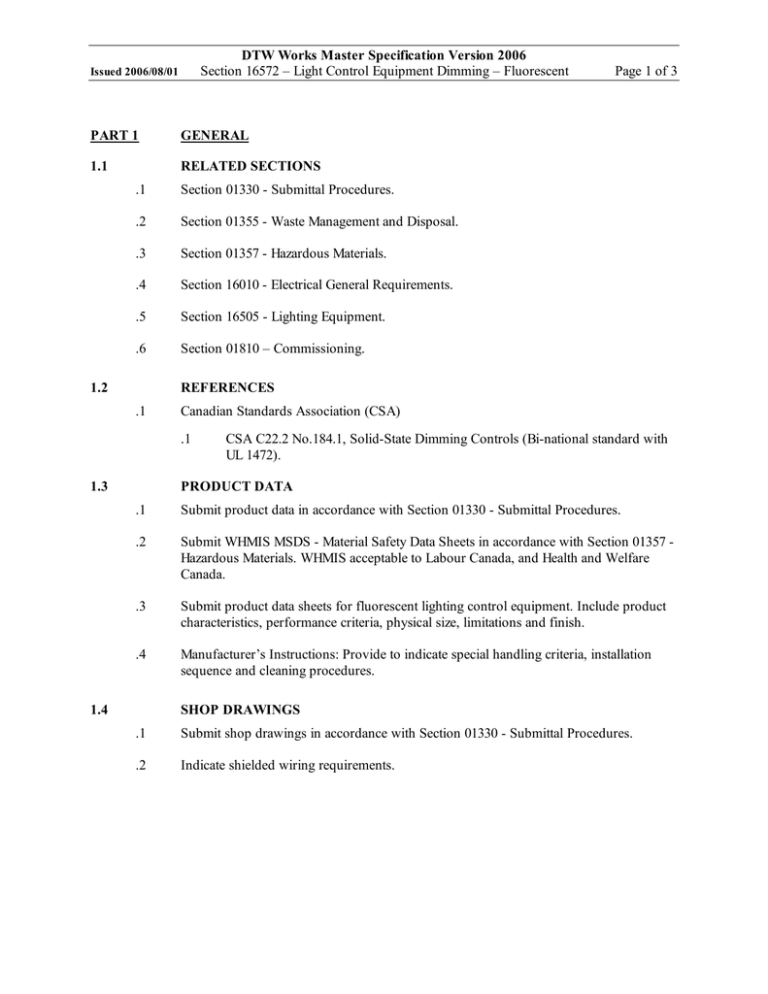
DTW Works Master Specification Version 2006 Section 16572 –Light Control Equipment Dimming –Fluorescent Issued 2006/08/01 PART 1 GENERAL 1.1 RELATED SECTIONS .1 Section 01330 - Submittal Procedures. .2 Section 01355 - Waste Management and Disposal. .3 Section 01357 - Hazardous Materials. .4 Section 16010 - Electrical General Requirements. .5 Section 16505 - Lighting Equipment. .6 Section 01810 –Commissioning. 1.2 Page 1 of 3 REFERENCES .1 Canadian Standards Association (CSA) .1 1.3 CSA C22.2 No.184.1, Solid-State Dimming Controls (Bi-national standard with UL 1472). PRODUCT DATA .1 Submit product data in accordance with Section 01330 - Submittal Procedures. .2 Submit WHMIS MSDS - Material Safety Data Sheets in accordance with Section 01357 Hazardous Materials. WHMIS acceptable to Labour Canada, and Health and Welfare Canada. .3 Submit product data sheets for fluorescent lighting control equipment. Include product characteristics, performance criteria, physical size, limitations and finish. .4 Manufacturer’s Instructions: Provide to indicate special handling criteria, installation sequence and cleaning procedures. 1.4 SHOP DRAWINGS .1 Submit shop drawings in accordance with Section 01330 - Submittal Procedures. .2 Indicate shielded wiring requirements. Issued 2006/08/01 DTW Works Master Specification Version 2006 Section 16572 –Light Control Equipment Dimming –Fluorescent PART 2 PRODUCTS 2.1 EQUIPMENT - GENERAL Page 2 of 3 .1 Dimming system: to CSA C22.2 No.184.1, packaged in accordance with the Canadian Code for Preferred Packaging guidelines, components to be from one manufacturer, and to comprise an integrated system. .2 System to start, and operate continuously, within intensity setting of 20 to 100%. .3 System to include approved radio, VCR and TV interference suppressors. .4 System voltage as indicated. 2.2 INTENSITY SELECTOR .1 2.3 Intensity selector unit, containing solid state firing circuit, master potentiometer, manually operated, motorized for remote control, providing for continuous adjustment from maximum intensity, to 20 % of maximum intensity, and actuating up to 100 multiple dimming auxiliaries, suitable for installation in three gang wall box and complete with knob and faceplate. ON-OFF SWITCH .1 2.4 On-off switch mounted in same wall box as intensity selector. DIMMING AUXILIARIES .1 2.5 Dimming auxiliaries, to control 4 or 6 multiple dimming ballasts, suitable for mounting in lighting fixture as required. BALLASTS .1 2.6 Section 16505. RELAYS, CONTACTORS .1 Enclosed solid-state relays, contactors and controls for multipoint control. PART 3 EXECUTION 3.1 INSTALLATION .1 Install components comprising dimming system in accordance with manufacturer's instructions, and as indicated. .2 Install wiring, shielding, grounding in accordance with manufacturer's instructions. Issued 2006/08/01 DTW Works Master Specification Version 2006 Section 16572 –Light Control Equipment Dimming –Fluorescent Page 3 of 3 .3 Ensure shielded leads between intensity selector potentiometer and intensity controls have outer insulating jackets and are connected to ground at one point only. .4 Keep radio, VCR, TV and intercom wiring a minimum of 1.8 m away from dimming circuitry. Where crossing of wiring is essential, ensure that grounded shields surround such intercom wiring, and that crossings take place at 90E. .5 Locate intensity controls and "on-off" switches as indicated. .6 Ensure positive, low resistance lamp to pin contact within lampholder. .7 Age lamps by operating at full intensity for 100 h prior to final inspection. Operate ballasts in ambient temperature above 18EC. .8 Ensure connections are correctly made and to same phase before energizing. 3.2 FIELD QUALITY CONTROL .1 Perform tests in accordance with Section 16010 - Electrical General Requirements and Section 01810 - Commissioning. .2 Demonstrate that dimming systems are installed as indicated. .3 Demonstrate that dimming systems operate as intended and that there are no problems in starting lamps, nor in keeping them lit, and free of perceptible flicker at any setting of dimming intensity control. .4 Demonstrate that no radio, VCR or TV interference is carried by system and that there is no interference between dimming system and locally used infrared-based remote/integral controls. END OF SECTION

